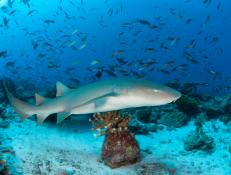Articles
Showing 31 - 45 of 2,629 results
Shark Week: The Podcast - Superstar Kesha Lifts the Gag Order on Saving Sharks
Pop superstar Kesha joins Shark Week’s Luke Tipple on the podcast to discuss her love of sharks, how her music funds her addiction to diving, and how you can find inner peace while under the water. And at the end, our researcher Sierra drops in to tell us that some sharks have teeth in their eyes.
Shark Week: The Podcast - Lights! Camera! TEETH! Making Shark Docs
Shark Week’s Luke Tipple is joined by longtime filmmaker and Emmy-award-winner Andy Casagrande. He’s filmed and appeared in dozens of shark documentaries, and might just be the most prolific shark cinematographer in history. He talks with Luke about his career, the contentious term “shark porn,” and the future of the industry. And at the end, our researcher Sierra talks about the unprecedented ways that sharks are currently endangered.
Shark Week: The Podcast - How Many Sharks Are Yet to Be Discovered?
Luke Tipple is joined by Shark Week host and all-around adventurer Forrest Galante. They discuss his upcoming special Alien Sharks: South Africa, Forrest’s remarkable talent for finding creatures once believed to be extinct, and how many shark species may still be unknown. Then, our researcher Sierra stops by to tell us about the world’s most prehistoric shark.
Shark Week: The Podcast - How Smart Are Sharks?
The discussion turns this week to sharks’ intelligence, and how it varies among species. Host Luke Tipple is joined by Dr. Tristan Guttridge, a behavioral ecologist and veteran of Shark Week whose research has tackled the social smarts, and even personalities, of different kinds of sharks. He sheds light on why we shouldn’t just think of them as dumb fish with rows of razor-sharp teeth. And at the end, our researcher Sierra Kehoe tells us about shark hypnosis.
Naked and Afraid: Last One Standing Survivalist's Weekly PSR Ratings
Naked and Afraid: Last One Standing premieres May 7 on Discovery 12 Survivialists competed for $100k cash prize and ultimate bragging rights
Shark Week: The Podcast - Do Scientists Need to Kill Sharks?
Host Luke Tipple welcomes two guests to discuss how researchers can kill sharks in the name of science – and whether they need to at all. The first is Dr. Neil Hammerschlag, shark researcher and founder of Atlantic Shark Expeditions, and an expert on data-gathering in the field. He’s followed by explorer Fred Buyle, a world-record-breaking freediver whose innovative methods of shark tagging are explored. Plus, our researcher Sierra tells us about how a 50-year study changed our understanding of tiger sharks – and much of the work wasn’t even done by scientists.
Shark Week: The Podcast - Do You Have the Guts to Be a Shark Handler?
Host Luke Tipple welcomes a pair of divers – Leigh Cobb and Josh Eccles – who have taken their passion for sharks and turned it into a dangerous career. They explore what it takes to swim with sharks for a living, then go into common myths and facts on what to do in the open water – if you ever come face to face with a shark. Plus, our researcher Sierra drops by with a new species of shark discovered in the freezing depths of the ocean.
Shark Week: The Podcast - How Shark Fishing Funds Human Trafficking
Luke Tipple is joined by Pulitzer Prize-winning journalist and author of the Outlaw Ocean Ian Urbina, who has dedicated his life to chronicling crime on the high seas. They discuss the state of our world’s oceans, how nearly 20% of your seafood was likely caught illegally, and the surprising link between modern slavery and the killing of sharks.
Shark Week: The Podcast - How Did a Shark Encounter Survivor Become an Advocate for Their Protection?
Shark Week’s Luke Tipple welcomes professional photographer Mike Coots, who lost his leg to a tiger shark attack when he was only 18. But after his horrific injury, he came to love sharks, and became a lifelong advocate for their safety. Luke and Mike discuss his career, his love for photographing sharks, and how to positively approach the big life-changing moments that can happen to any of us.
Caves to Condors: Uncovering Pinnacles National Park
Photographer and conservationist Ian Shive explores one of the lesser known National Parks, Pinnacles National Park, finding rare wildlife and extraordinary landscapes along the way.
Bobcat on the Hunt
Nature photographer Ian Shive gets a rare close-up of a bobcat hunting ground squirrels in California's Central Coast.
Explore the Rugged, Remote Chaco Canyon in New Mexico
Photographer and conservationist Ian Shive photographs one of the most remote and rugged parts of the United States to take us on a journey to Chaco Canyon in New Mexico's Chaco Culture National Historical Park.
Year in Review: Nature in Focus Adventures
For many years I've looked back on the year in review and thought about all of the incredible adventures I've experienced and this year is no exception.
Ready, Set, Pup! Introducing Puppy Bowl XVIII
Everyone’s favorite game is back in action! PUPPY BOWL is back with more ear pulls, tail tugs, sloppy kisses, and touchdowns you won't want to miss. Get ready to cheer on the puppy players of Team Ruff and Team Fluff as they give it their all.
Great Migrations
Brrrrr it’s getting cold out, the days are shorter and soon it’ll be winter! Fall means that more than 4 billion birds will stream overhead on their fall migration to warmer grounds down south, where they will feed and mate.






















